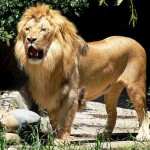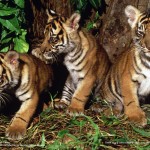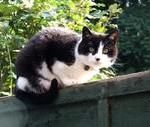Ni igbà àtijọ́, ẹranko ti wọn pè ni Ẹkùn jẹ alágbára ẹranko, bẹni Kìnìún si jẹ́ alágbára ẹranko. Bi Kìnìún ti lágbára tó ninú igbó, bi ó bá bú ramúramù, ohun gbogbo ninú igbó á pa kẹ́kẹ́ titi dé ori ẹranko yoku. Ti Ẹkùn nikan ló yàtọ̀, nitori Ọlọrun fún ni ẹ̀bùn igbóyà, idi niyi ti a fi ńpè ni “Baba Ẹranko”, ti a ńpè Kìnìún ni “Ọlọ́là Ijù”.
- Ẹkùn “Baba Ẹranko” – Tiger “Father of Animals
- Kìnìún ni “Ọlọ́là Iju – Lion “The King of the Forest”.
- ọmọ Ẹkùn – Tiger’s cubs
- Ológbò/Ológìní – Cat
Ni ọjọ́ kan, Ẹkùn gbéra lọ sinú igbó lati lọ wa oúnjẹ fún àwọn ọmọ rẹ, àwọn ọmọ ẹ kéré wọn kò lè yára bi iyá wọn. Ó fún wọn ni imọ̀ràn pe ki wọn kó ara pọ̀ si ibi òkiti-ọ̀gán ti ohun ti lè tètè ri wọn, ṣùgbọ́n wọn kò gbọ́dọ̀ bẹ̀rù fún ohunkóhun tàbi ẹranko ti ó bá wá si sàkáni wọn.
Gẹgẹ bi a ṣe mọ, Kìnìún àti Ẹkùn, ọ̀gá ni onikálùkù láyé ara wọn, wọn ki ja. Ibi ti Kìnìún bá wà Ẹkùn kò ni dé ibẹ̀, ibi ti Ẹkùn bá wà Kìnìún ò ni dé ibẹ̀. Nitori èyi ni Yorùbá fi npa lowe pé “Kàkà ki Kìnìún ṣe akápò Ẹkùn, onikálùkù yio má ba ọdẹ rẹ̀ lọ”.
Lai fà ọ̀rọ̀ gùn àwọn ọmọ Ẹkùn gbọ́ igbe Kìnìún, wọn ri ti ó ré kọja, àwọn ọmọ Ẹkùn ti ẹ̀rù ba ti kò ṣe bi iyá wọn ti ṣe ìkìlọ̀, ìjáyà bá wọn, wọ́n sá. Nigbati Ẹkùn dé ibùdó rẹ lati fún àwọn ọmọ rẹ ni ẹran jẹ, àwọn ọmọ rẹ kò pé, ṣ̀ugbọ́n àwọn ọmọ ti ijáyà bá padà wá bá iyá wọn, nigbà yi ni iyá wọn rán wọn leti ikilọ̀ pé wọn kò gbọ́dọ̀ jáyà. Nitori èyi, ohun kọ̀ wọ́n lọ́mọ.
Nigbati iyá wọn kọ̀ wọ́n lọ́mọ, wọn kò lè ṣe ọdẹ inú igbó mọ́, wọn di ẹranko tó ńrágó, ti wọn ńsin ninú ilé, to ńpa eku kiri. Idi èyi ni Yorùbá fi npa ni òwe pé “Ìjayà ló bá ọmọ Ẹkùn ti ó di Ológbò ti ó ńṣe ọde eku inú ilé.
ENGLISH TRANSLATION
In the olden days, the “Tiger” was a powerful animal, so also was the Lion very powerful. As powerful as the Lion was in the forest, when it roars, everything in the forest became silent including other animals. Only the Tiger was different because he/she was endued with boldness, hence he/she is called “Father of the animals” while the Lion is known as “King of the Forest”.
One day, the Tiger left to the forest to fetch food for cubs who were not as fast as their mother. She instructed them to gather together on top of the anthill where she could sight them quickly, but they must not be afraid for anything or other animals that came near them.
As it is known, the Lion and the Tiger were the boss in their own right, they never fought. Wherever the Tiger was, the Lion would not cross, likewise wherever the Lion was, the Tiger would not cross. As a result of this, the Yoruba proverb said “Instead of the Lion to become the Tiger’s treasurer, each party will have to go their separate ways”.
In order not to prolong the matter, the Tigers cubs heard the Lion’s roar, and him pass bye, some of the Tiger’s cubs that were afraid disobeyed their mother’s instruction not to be fearful, so they ran. When the Tiger arrived with the prey she had caught to feed her cubs, they were incomplete, but they later returned. It was on their return that their mother reminded them of her instruction not to fear. As a result she disowned them.
As their mother has disowned them, they were unable to hunt for themselves in the forest, hence they became wondering animals, domesticated and hunting after rats. This is why the Yoruba proverb said “It is fear that turned the Tiger’s cub to the cat that hunts after the house rat”.
Originally posted 2016-03-29 10:45:48. Republished by Blog Post Promoter







Really like the proverb about fear. My take away from here is that we should stay true to ourselves and not let fear control and degrade us.
What I deduce from this excerpt is to always believe in yourself and have an extra dose of confidence.Else you’ll loose all that you truly stand for…Your dignity.
Yes , that is the reason why Nigerians are wallowing in poverty and ignorance since their independence. ‘FEAR’ , is defined as “Futility express as reality” gripped their psychic , as a result Nigerians are unable to engage the power that be . Oppression and subjugation becomes compartmentalized, and therefore they are psychically norming. Ojo ni ko je ki Nigeria gb’ara won sile lowo awon Olosa ati awon o nije wobia (Barao).Their churches could not liberate them, since they are still embracing the “SADATIVE- EUROPEAN Theology cloaked with African Liturgy. O ma se o………..,,,,,,,,,,,,,,,,,,,,,om’ekun to di Ologbo to nsode ekute ile.